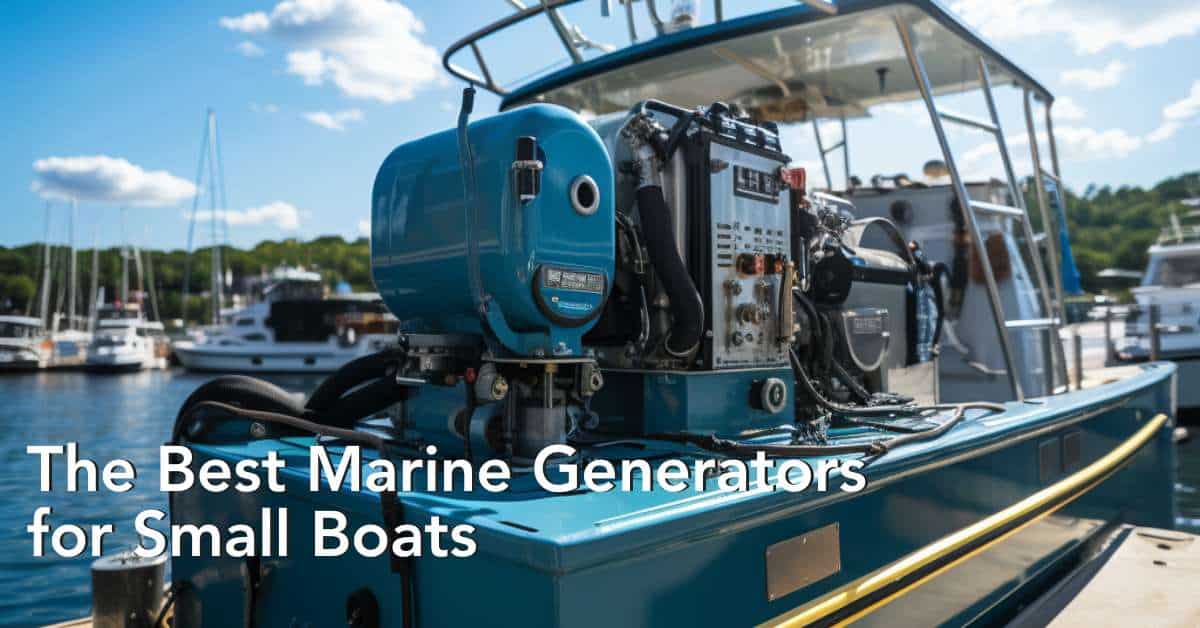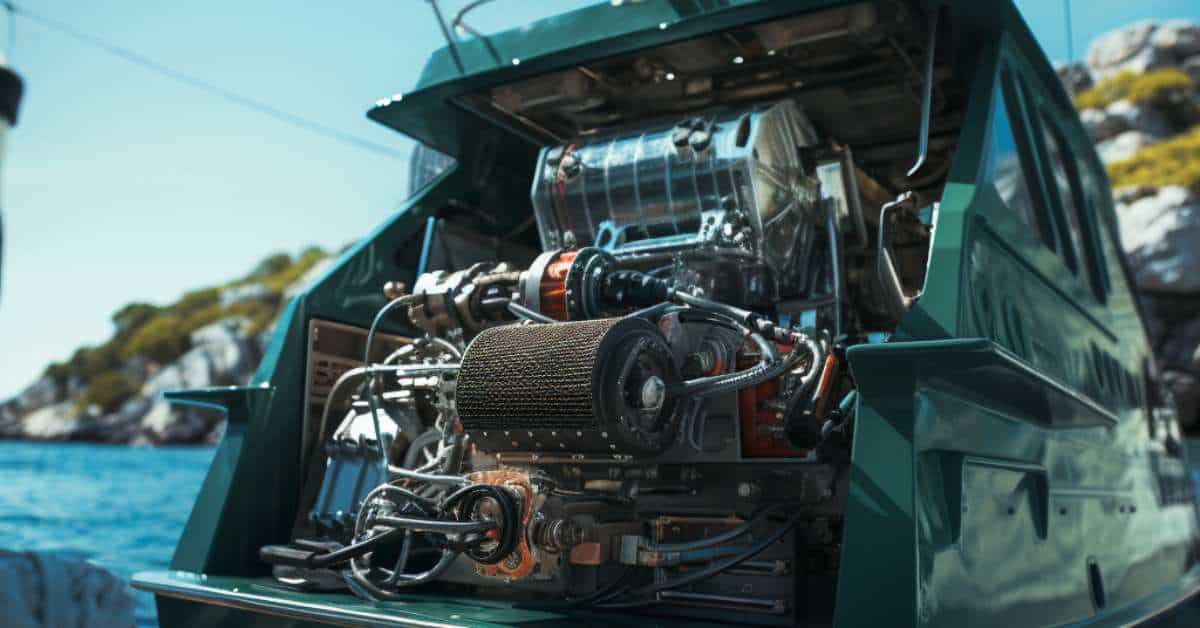Last Updated on September 26, 2023 by kiezelamquiz

Navigating the vast open waters on a small boat can be an exhilarating experience. However, to keep everything running smoothly and ensure an enjoyable journey, a reliable marine generator is essential.
Marine generators for small boats provide reliable power for onboard systems. Consider top products like the reliable and portable Honda EU2200i and the top-rated and ultra quiet Yamaha EF2000iSv2.
Read on to find out more about the top marine generators for small boats, the key factors to consider when choosing one, and some safety and maintenance tips to keep your power source running smoothly.
Top 5 Marine Generators for Small Boats (Starting With The Top 3)
Honda EU2200i Super Quiet Inverter Generator |
Westinghouse iGen2500 Inverter Generator |
YAMAHA EF2200iS Inverter Generator |
|---|---|---|
 |
 |
 |
| 48 to 57 dBA | 52 dBA | 51.5 dBA |
| 47.4 pounds | 46.3 pounds | 55.2 pounds |
| Excellent Honda engine | Affordable | Very quiet |
| Efficient and easy to use | Safe for sensitive electronics | Excellent construction quality |
| Produces clean power | Lightweight and portable | Good power output |
| Check Price | Check Price | Check Price |
| Read more here… | Read more here… | Read more here… |
Having a basic understanding of marine generators helps narrow down your choices. Let’s look at five top-rated marine generators, each offering unique benefits to meet various needs on small boats.
1. Honda EU2200i
The Honda EU2200i is a portable generator renowned for its quiet operation and durability. This generator won’t disrupt your peaceful time on the water. Plus, its robust design ensures that it can withstand harsh marine environments.
Beyond its low noise level and durability, the Honda EU2200i boasts impressive fuel efficiency. This trait, along with its easy maintenance and clean power output, makes it a top choice among small boat generators.
Pros & Cons of The Honda EU2200i
Pros
- Extremely quiet at only 48-57 dBA
- Fuel efficient
- Lightweight and portable
- Parallel capability to double power
Cons
- No electric start
- Only provides 120V power
- Low power output for larger boats
2. Westinghouse iGen2500
With its lightweight and compact size, the Westinghouse iGen2500 is built for portability and convenience. The sturdy frame and reliable power production make this generator well-suited for small boats.
While not as quiet as some models, the iGen2500 operates smoothly to provide steady, safe power for your sensitive electronics. The affordable price point makes this generator accessible for boating enthusiasts looking for an entry-level onboard power source.
Pros & Cons of The Westinghouse iGen2500
Pros
- Affordable
- Safe for sensitive electronics
- Lightweight and portable design
Cons
- Louder than some models at 52 dBA
- No electric start
- Low power output
3. Yamaha EF2000iSv2
Weighing in at a mere 44.1 pounds, the Yamaha EF2000iSv2 Generator offers an excellent blend of portability and power. This lightweight generator doesn’t compromise on performance, providing stable power for a variety of onboard devices.
It features an “Eco Mode” that adjusts the engine speed to match the power load, enhancing fuel efficiency. This handy feature, coupled with its overall portability, makes it a popular choice among small boat owners.
Pros & Cons of The Yamaha EF2000iSv2 Generator
Pros
- Only 51.5 dBA
- Excellent reliability and construction quality
- Good power output
Cons
- Expensive
- No electric start
- Limited power for larger boats
4. Champion 3500-Watt
With a heavy-duty open frame build, the Champion 3500-Watt generator provides ample power for onboard appliances and electronics. The electric start feature allows quick, easy startup without excessive pulling and resistance.
Champion is trusted for durable, high-performance generators suited for recreation and home backup uses. And with a 3,500-watt output, this model can handle most electrical needs for small to mid-sized vessels. Just keep in mind the noise tradeoff of an open frame design.
Pros & Cons of The Champion 3500-Watt generator
Pros
- Strong power output
- Electric start is convenient
- Champion is a leading brand
Cons
- Very loud at 68 dBA
- Heavy and bulky frame
- No inverter
5. Generac GP3000i
Generac’s GP3000i packs advanced inverter technology into a compact, portable package weighing just 80 pounds. The TruePower design provides stable, clean electricity for sensitive devices.
With electric start capability and a robust set of outlets, the GP3000i can readily power appliances, lights, and electronics on your small boat. It’s not the quietest model, but considerably smoother than open frame generators. Overall, a solid mid-sized choice.
Pros & Cons of The Generac GP3000i
Pros
- Electric start
- Versatile power options
- Compact size
- Quieter than open frame
Cons
- Heavier than some models
- Pricey
- Still loud at 58 dBA
Understanding the Role of Marine Generators in Small Boats

Sailing away from the shore doesn’t mean you have to give up the conveniences of modern life. The key to this convenience lies in the ability of marine generators to power your boat’s systems.
Why Invest in Marine Generators for Small Boats?
Marine generators for small boats are the unsung heroes of boating, providing the power needed to run everything from navigation systems and communication devices to kitchen appliances.
Having a reliable generator on board can greatly enhance your boating experience, giving you the freedom to spend more time on the water without worrying about power limitations.
With the advent of more electrical devices in modern boats, the role of marine generators has become more critical than ever. Not only do they provide convenience, but they also offer safety, powering vital equipment that can be the difference between an enjoyable trip and a distressing situation.
You might be interested to learn how to run a boat generator while underway.
Different Types of Marine Generators and Their Applications
Marine generators come in various types, primarily distinguished by their fuel source.
Common types include diesel generators, propane generators, and gas generators to power your boat. Your choice among these will depend on factors such as your boat’s design, the availability of fuel, and your power requirements.
Diesel generators, like the Cummins Onan Marine QD 3200, are known for their efficiency and longevity, making them an excellent choice for long trips. Gasoline generators, such as the Honda EU2200i, are typically more compact, suitable for smaller boats with limited space.
Propane generators are a cleaner alternative, emitting fewer greenhouse gasses than their counterparts, but they require proper storage and handling for safety.
Key Factors to Consider When Choosing a Marine Generator for Your Small Boat
Choosing the best marine generator requires understanding your boat’s needs and the generator’s specifications. Let’s explore the key factors to consider to ensure you choose a generator that will reliably meet your needs on the water.
Assessing Your Power Needs
The first step in selecting a marine generator is understanding your power needs. This involves listing all the devices and systems on your boat that require electrical power, from navigation systems and radios to kitchen appliances and lighting.
After making the list, calculate the total power requirements. This information is typically found on the device’s label or in its user manual.
Knowing your total power needs will guide you in selecting a marine generator that can meet these demands without straining its capacity.
Space Considerations on Your Boat
One unique aspect of choosing a marine generator for a small boat is the space limitation. It’s crucial to consider not just the generator’s size but also the space required for proper ventilation and access for maintenance.
When selecting a generator, consider where it will be installed and whether there’s sufficient room for it. Compact and portable generators for boats like the West Marine Portable Generator or the Yamaha EF2000iSv2 Generator can be more suitable for smaller ones.
Fuel Type and Availability
The type of fuel your generator uses is another crucial consideration. Different fuel types have varying availability, cost, storage requirements, and environmental impact.
Diesel generators are typically more efficient and longer-lasting, but diesel fuel can be more challenging to store. Gasoline generators are more compact and have readily available fuel, but they tend to be less efficient. Propane is a cleaner fuel alternative, but it requires proper storage to ensure safety.
Noise Levels and Comfort
Noise level is often overlooked when choosing a generator, but it can significantly impact your comfort on the boat. A noisy generator can disrupt your peaceful time on the water, making your journey less enjoyable.
When considering generators, look at their noise level ratings. Generators like the Honda EU2200i and the Cummins Onan Marine QD 3200 feature quiet operation, ensuring that your sea voyage remains a peaceful retreat.
Safety and Maintenance Tips for Your Marine Generator
Just like any other mechanical device, marine generators require regular maintenance to ensure their longevity and safety. Understanding the basic maintenance practices and safety measures can help you get the most out of your generator.
Regular Maintenance
Regular maintenance of your marine generator can prevent unexpected breakdowns and prolong its life. Maintenance tasks include regular oil changes, replacing air filters, checking the cooling system, and inspecting the generator for any signs of wear and tear.
Routine maintenance is also an opportunity to identify potential issues before they become major problems. It ensures your generator is in optimal condition to reliably power your boat, giving you peace of mind on your sea voyages.
Proper Installation and Handling
Using a generator on a boat requires a keen awareness of safety considerations. Marine generators should always be installed in well-ventilated areas to prevent carbon monoxide build-up.
Also, ensure that the generator’s exhaust system is appropriately installed and regularly inspected to avoid any leaks. Moreover, always handle fuel with care, and make sure you have appropriate fire extinguishing equipment onboard.
Safety should be your top priority, ensuring your boating experience remains enjoyable and worry-free.
You might also be interested to learn about grounding a generator on a boat.
Ensuring a Reliable Power Source for Your Small Boat
Choosing the right marine generator for your small boat ensures a seamless blend of modern comfort with the serenity of the open waters. By understanding the role of generators, assessing your power needs, considering the space on your boat, and paying attention to fuel type and noise levels, you can select the perfect generator for your needs.
Remember, the key to a reliable marine generator lies not just in the initial choice but also in regular maintenance and adhering to safety practices.
Whether you opt for the compact West Marine generator, the quiet Honda EU2200i, or the efficient Cummins Onan Marine QD 3200, your sea voyages will be more enjoyable with a reliable power source. Navigate the waters with confidence, knowing that your marine generator has you covered.

Scott Krager purchased generatorgrid.com in the summer of 2020 and quickly began to buy every generator under the sun! He currently has over a dozen generators and the number is growing quickly. He lives in Portland, OR near his family and friends.
GeneratorGrid.com is an independent review business. I am not affiliated with any manufacturers and do not accept paid reviews. When you buy through my links, I may earn a commission which helps me purchase more generators for testing. - Scott Krager

